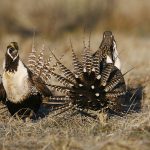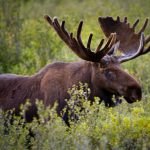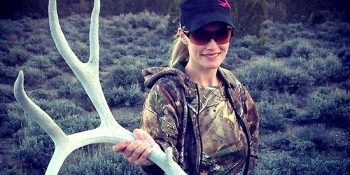New restrictions on shed antler and horn collection take effect on Friday, March 2
DENVER, Colo. – Antler collectors and all people taking to Colorado for recreation are reminded that shed antler and horn collecting is prohibited on all public lands west of I-25 from March 2 through April 30. Additionally, in order to maintain protection for the Gunnison sage-grouse, the new regulations include a closure to collection of shed antlers on public lands May 1 to May 15 from sunset to 10 a.m. in the Gunnison basin (Game Management Units 54, 55, 66, 67, 551).

The new regulation was approved by the Colorado Parks and Wildlife Commission in January. Starting next year and in all subsequent years, the seasonal collection prohibition starts on Jan. 1 and continues through April 30.

The purpose of this regulation is to reduce stress on wintering big game animals during the time of year when deer, elk, pronghorn and moose are most vulnerable. Stress can result in decreased body condition, increased mortality and decreased survival of deer fawns and elk calves. These regulations protect the health of Colorado’s big game herds and other wintering wildlife.
CPW will be working with recreation organizations, land-use management agencies, visitors bureaus and local communities to get the word out about these new restrictions. Protecting our wintering wildlife is something we have to do together.
As more people enjoy each season that Colorado has to offer, and new forms of recreation continue to emerge, it is increasingly important that everyone involved in outdoor recreation help to educate others about conservation of our public lands. — CPW Director Bob Broscheid
Anyone violating the closure or in possession of antlers or horns during the closure period will be fined at least $68. Even if you are not intentionally looking for antlers you are prohibited from picking up antlers.
Because wildlife officers patrol vast areas, CPW is asking for help from the public to enforce the new regulations. If you see activity that appears to be in violation of the closure regulation, please call the nearest CPW office or local law enforcement as soon as possible. Do not, however, confront or approach anyone you suspect is behaving illegally.
Information and Frequently Asked Questions
Why were these dates chosen?
In most parts of western Colorado, winter conditions affecting big game typically last into late April or early May, and big game are still losing weight and body condition. The April 30 date is intended to help minimize additional stress during this critical time frame.
In addition, these dates closely align with restrictions in neighboring states. For instance, Wyoming prohibits the collection of shed antlers and horns from January 1 through April 30 on public lands west of the Continental Divide.
Why are other kinds of recreation and hunting still allowed in areas where shed collection is restricted?
While it is true that these restrictions may overlap with some hunting seasons, the amount of pressure put on the animals will be limited by the number of hunting license holders. Some shed collectors use OHVs and snowmobiles in their search. Loud, fast-moving OHVs and snowmobiles are major sources of wildlife stress. Also, the CPW Commission does not regulate other forms of recreation such as hikers and bikers on other land-use agency properties such as the Bureau of Land Management lands or National Forest land.
What are the penalties for violations?
Our initial goal is to educate the public about the negative impacts to wildlife caused by irresponsible shed collecting and recreational activity, and why the new regulation is needed; however, based on officer discretion, violators will likely face a $50 fine and $18 surcharge. There will be five license suspension points applied to the violator’s privilege to apply for, purchase, or exercise the benefits conferred by any licenses issued by CPW. If a person accumulates 20 or more points within a five-year period, that person could be suspended from hunting and fishing for up to five years.
Additionally, possession of antlers during the closure on public lands west of I-25 can also be counted as a separate ($68) violation with each individual antler being considered a possible violation offense. In addition, apart from the new shed collection rules, harassing wildlife remains illegal and CPW officers will cite any individual violating this existing regulation. Harassing wildlife is a $137 violation that also includes 10 license suspension points. A $2.50 DNA surcharge will also apply to each citation that an officer issues to a violator.
What about private lands?
The CPW Commission chose not to include a private land requirement in its decision to enact a shed collection closure in Colorado. However, it is unlawful to collect sheds on private property unless a person has lawful access to that private property. Possession of antlers or horns on private property without lawful access is prohibited.
Is shed and horn collection growing in popularity?
Although shed collection is not a new activity in Colorado, there is evidence that it is rapidly growing in popularity. At the CPW Commission’s January meeting, both the commissioners and members of the public noted they had seen a big increase in shed collection around the state, likely due to the substantial profit collectors can make from the sale of shed horns and antlers. Once considered a fun, recreational activity for families or the source of a unique medium for artisans, shed collection is now a major business. As a result, a growing number of people are participating. Unfortunately, too many shed collectors are focusing on financial gain rather than protecting wildlife, creating the need for new regulations.
In some states, you need a permit to collect sheds. Is Colorado considering the same?
The requirement of a priced permit for collecting shed antlers and horns is a novel concept that would be precedent-setting in the western U.S. Although the CPW Commission decided not to require a permit at its latest meeting, it is an issue it may revisit in the future.
Will the BLM/Forest Service/Sheriff’s Office, enforce the new regulation as well?
These agencies may notify CPW if they catch violators and coordinate with CPW officers to take enforcement action.
Once an antler or horn drops, why is it still the purview of CPW? It is no longer ‘wildlife.’
Shed antlers or shed horns are still considered “wildlife” based on the statutory definition, which includes any parts thereof and whether alive or dead.
Have there been past restrictions?
Previously there were two localized antler collection closures in place, one for public lands in the Gunnison Basin and one for public lands in the Eagle and Roaring Fork Valleys. The problem with these closures was that it was moving the antler collection pressure to other areas of the state with important winter range habitats. The only other restriction that is also in place is the harassment of wildlife statute, which can be written to any individual who is harassing wildlife, including shed collectors. A harassment ticket is $137.
What if I’m doing something unrelated, like hiking, and find an antler?
If you are hiking in an area where there is currently a shed antler and horn collecting closure and you see an antler or horn, please leave it alone. There is no way for a CPW officer to differentiate between you and someone who entered the area for the purpose of shed collecting.
SPREAD THE NEWS
COMMENT, Like, Follow & SHARE @I70Scout
CURRENT EDITION
WEATHER & TRAFFIC PUZZLES RECENT NEWS ADVERTISE WITH US

Leave a Reply